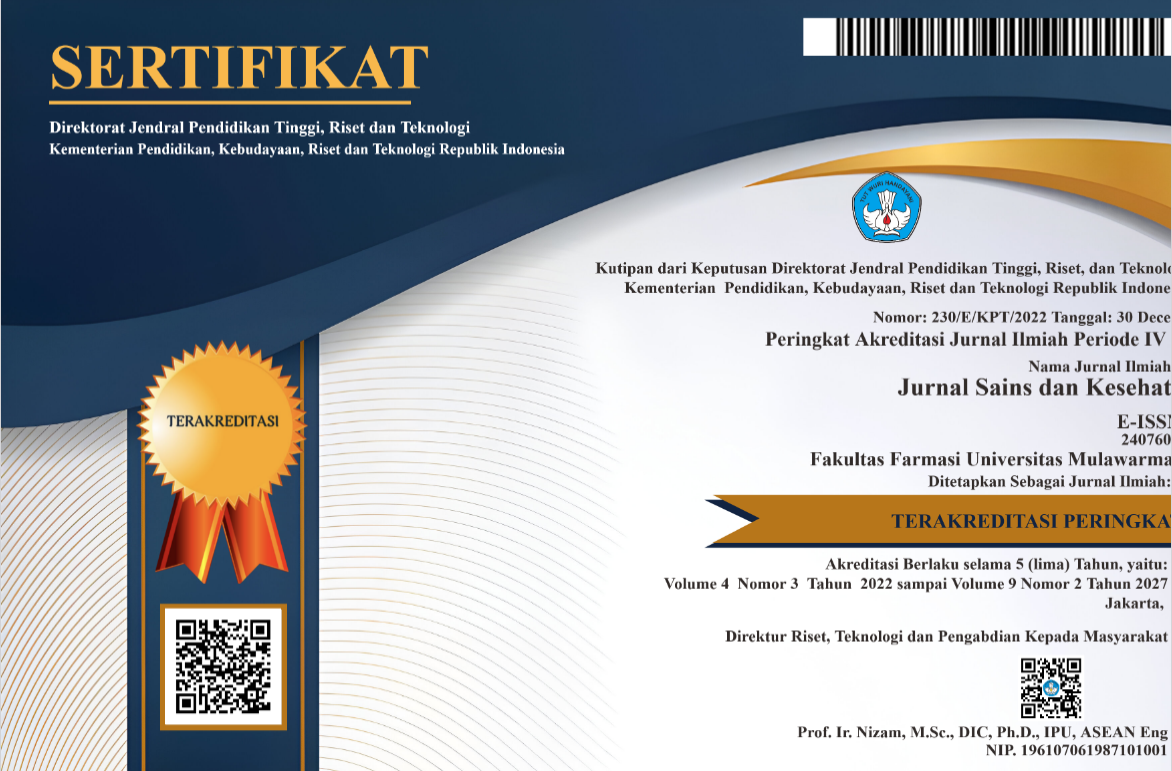Status Nutrisi, Komorbiditas dan Fungsi Kognitif pada Lansia Perempuan di Panti Wreda
DOI:
https://doi.org/10.30872/jsk.v6i2.819Keywords:
nutritional status, comorbidity, cognitive function, elderlyAbstract
Background
Cognitive impairment is a condition of decreased brain capacity that affects memory, concentration, and decision-making abilities. Nutritional issues have been linked to cognitive function. The presence of comorbid diseases can contribute to cognitive impairment through mechanisms such as vascular damage, neuroinflammation, and metabolic dysregulation. Understanding the complex interactions between nutritional status, comorbidities, and cognitive function is crucial for the early identification of at-risk individuals and the development of prevention and therapeutic strategies to maintain cognitive function.
Methods
This research involves the elderly (seniors) from the Al Madiniyah Family Welfare Center. Cognitive status was assessed using the MoCA-Ina instrument (Montreal Cognitive Assessment-Indonesian Version) and nutritional status using the MNA-SF instrument (Mini Nutritional Assessment-Short Form). Patient medical history was obtained through interviews with patients. Data was analyzed using descriptive statistics, and the relationships between variables were tested using multivariate analysis.
Results
This study involved 23 female subjects. The characteristics of the respondents' distribution based on age classification enter the middle elderly category with 11 subjects (47.83%), with an average age of the respondents being 72.9 years. The most common highest education level was primary school (SD) with 10 subjects (43.48%). The average MoCA-Ina score was 16.9, with a minimum score of 3 and a maximum of 29. There was 1 subject (4.36%) with severe dementia, 4 subjects (17.39%) with moderate dementia, 7 subjects (30.43%) with mild dementia, 9 subjects (39.13%) with mild cognitive impairment, and 2 subjects (8.69%) normal. Nutritional status measured by MNA-SF had an average score of 10.3, with a minimum score of 3 and a maximum of 14. There were 3 subjects (13.04%) with malnutrition, 14 subjects (60.87%) at risk of malnutrition, and 6 subjects (26.09%) with normal nutrition. For chronic disease data, out of 23 respondents, hypertension is the most common comorbidity (34.69%), followed by hypercholesterolemia (16.33%) and hyperuricemia (10.20%). Other comorbidities found include stomach disease, osteoarthritis, heart disease, cataracts and only 1 subject with diabetes mellitus.
Downloads
Published
Issue
Section
License
Copyright (c) 2025 Jurnal Sains dan Kesehatan

This work is licensed under a Creative Commons Attribution-NonCommercial 4.0 International License.
Deprecated: json_decode(): Passing null to parameter #1 ($json) of type string is deprecated in /home/jskff/public_html/plugins/generic/citations/CitationsPlugin.php on line 68
How to Cite
Most read articles by the same author(s)
- Marcella Adisuhanto, Irene Vanessa, Mario Steffanus, Riki Tenggara, Hubungan Antara Kejadian Anemia dengan Temuan Endoskopi Saluran Pencernaan Atas pada Pasien Tanpa Manifestasi Hematemesis dan Melena , Jurnal Sains dan Kesehatan: Vol. 6 No. 3 (2025): J. Sains Kes.
- Nanny Djaja, Christina Jeanny Soekiono, Irene Vanessa, Efek Asam Lemak Omega-3 pada Pemulihan dari Prosedur Kardiovaskular , Jurnal Sains dan Kesehatan: Vol. 6 No. 3 (2025): J. Sains Kes.
- Nelson Sudiyono, Irene Vanessa, Pengaruh Pemberian Terapi Fisik Dada pada Pasien Geriatri dengan Pneumonia terhadap Luaran Klinis di Unit Perawatan Intensif Rumah Sakit Atma Jaya , Jurnal Sains dan Kesehatan: Vol. 6 No. 3 (2025): J. Sains Kes.
- dr Rr Josephine Retno Widayanti, SpN., M.Kes, Dr.dr Tena Djuartina.M.Biomed., PAK (K), Dr.dr. Iskandar Rahardjo Budianto, Sp.B, Subsp.Ped(K), Dr. dr. Poppy Kristina Sasmita, Sp.S., M.Kes., AIFO-K., PAK(K), Dr. dr. Herlina Uinarni, Sp.Rad., Subsp.RA(K)., PAK(K), Albertus Bisma Wisnumurti Adriandaru, S.Sos., Rini, S.Gz, Profil Sosiodemografi dan Penyakit Penyerta Lansia di Panti Wreda PUSAKA Cengkareng, Jakarta , Jurnal Sains dan Kesehatan: Vol. 6 No. 1 (2025): J. Sains Kes.
Similar Articles
- Surilena Hasan, Clara Rosa Pujiyogyanti Ajisuksmo, Josephine Retno Widayanti, Hubungan Kecemasan, Fungsi Kognitif dengan Kualitas Tidur pada Lansia di Panti Wreda Jakarta dan Tangerang , Jurnal Sains dan Kesehatan: Vol. 6 No. 2 (2025): J. Sains Kes.
- Jamil Anshory, Aulia Dwi Nur Anggraini, Satriani Satriani, Protein Intake, Nutritional Status, and Family Socioeconomic Relationships with Learning Achievement of Children Aged 13-15 Years at Nabil Husein Junior High School Samarinda Year 2022 , Jurnal Sains dan Kesehatan: Vol. 5 No. 1 (2023): J. Sains Kes.
- Safira Nuraini, Yasmin Sabina Sa'diah, Evi Fitriany, Hubungan Usia Menarche, Status Gizi, Stres dan Kadar Hemoglobin Terhadap Kejadian Dismenorea Primer pada Mahasiswi Fakultas Kedokteran, Universitas Mulawarman , Jurnal Sains dan Kesehatan: Vol. 3 No. 3 (2021): J. Sains Kes.
- Putri Lintang Kharisma, Annisa Muhyi, Eva Rachmi, Hubungan Status Gizi, Umur, Jenis Kelamin dengan Derajat Infeksi Dengue pada Anak di RSUD Abdul Wahab Sjahranie Samarinda , Jurnal Sains dan Kesehatan: Vol. 3 No. 3 (2021): J. Sains Kes.
- Alius Cahyadi, Maria Riastuti Iryaningrum, Christina Jeanny, Status Nutrisi pada Pasien Penyakit Ginjal Kronik yang Menjalani Hemodialisis dan Non-dialisis di RS Atma Jaya Tahun 2021-2024 , Jurnal Sains dan Kesehatan: Vol. 6 No. 3 (2025): J. Sains Kes.
- Margareta Amelia N, Isadora Gracia Departemen Ilmu Penyakit Gigi dan Mulut, Fakultas Kedokteran dan Ilmu Kesehatan, Universitas Katolik Indonesia Atma Jaya, Jakarta, Indonesia, Linawati Hananta, Polimorfisme CYP2R1 dan CYP27B1 serta Status Vitamin D terhadap Respons Imun: Tinjauan Scoping , Jurnal Sains dan Kesehatan: Vol. 6 No. 1 (2025): J. Sains Kes.
- Rensa Rensa, Ignatius Danny Pattirajawane Pattirajawane, Bryani Titi Santi, Status Nutrisi Lansia di Panti Lansia. Suatu Studi Deskriptif , Jurnal Sains dan Kesehatan: Vol. 6 No. 2 (2025): J. Sains Kes.
- Mukhlidah Hanun Siregar, Mustika Arumbinang, Junengsih Junengsih, Eksplorasi Obesitas Sebagai Faktor Komorbid Covid-19: A Systematic Review , Jurnal Sains dan Kesehatan: Vol. 4 No. 5 (2022): J. Sains Kes.
- Laillatul Mas’udah, Dhani Wijaya, Nabila Asha Rahmita, Ulva Nur Rahmawati, High Calcium Boba from Egg Shells to Prevent Stunting and Boost the Immune System , Jurnal Sains dan Kesehatan: Vol. 5 No. 2 (2023): J. Sains Kes.
- Silvanus Giovanny Bunga Allo, Meiliati Aminyoto, Yuliana Rahmah Retnaningrum, Hubungan Status Gizi dan Kepatuhan Diet dengan Kualitas Hidup pada Pasien Penyakit Ginjal Kronis yang Menjalani Hemodialisis Rutin di RSUD Abdul Wahab Sjahranie Samarinda , Jurnal Sains dan Kesehatan: Vol. 2 No. 4 (2020): J. Sains Kes.
You may also start an advanced similarity search for this article.




